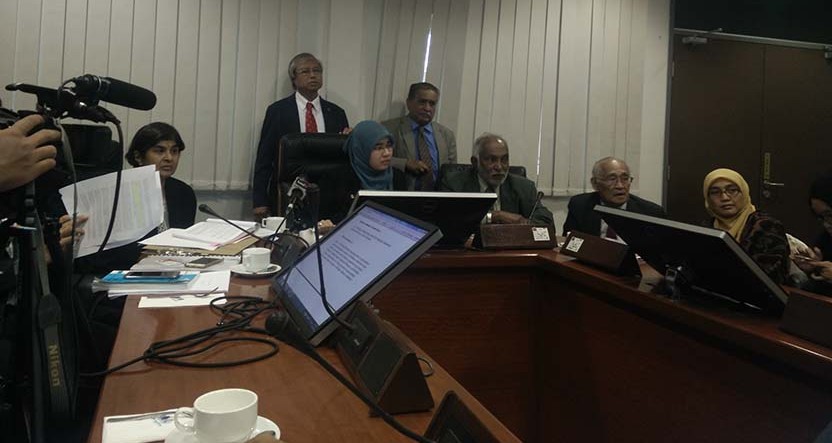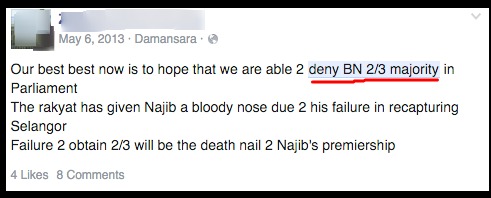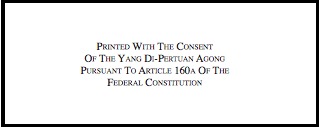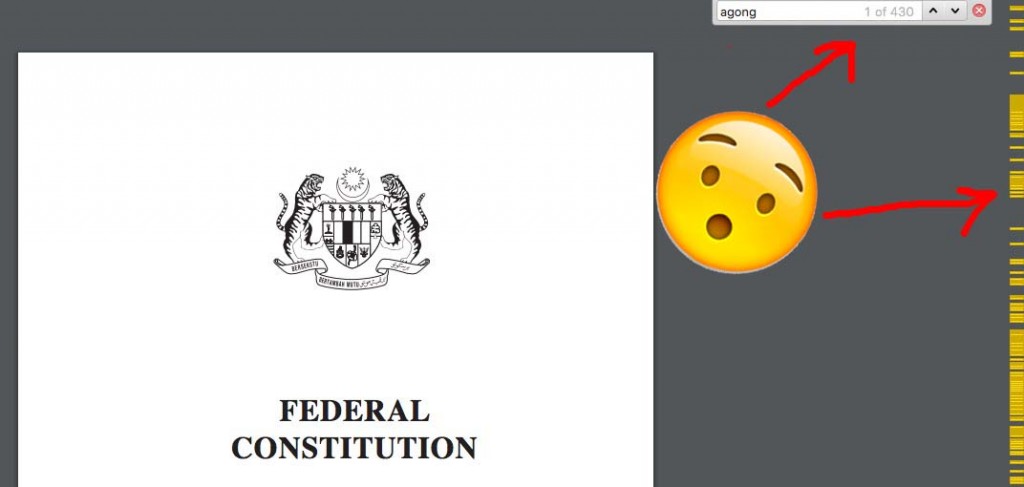Can Najib use the “Dictator Bill” to rampas the Army from Agong?

- 1.0KShares
- Facebook993
- Twitter10
- Email4
- WhatsApp4
*Artikel ni ada dalam Bahasa Melayu, tekan sini untuk baca!
If we could generate electricity from controversy, the National Security Council (NSC) Bill would put TNB out of business for the next year. We’ve covered how badly the NSC would affect you, and how weaknesses in our parliamentary system allow Bills like these to pass. We thought we were done, but the people at TakNakDiktator – a group of NGOs opposing the NSC Bill – revealed during a meet with Dewan Negara Senators (if you don’t know what these are, click here) that a retired Lieutenant-Colonel from the Malaysian Army revealed that the NSC Bill is extra-unconstitutional because it takes away control of the Armed Forces (military) from the Agong!

Incidentally, the Lieutenant-Colonel was also prevented by the military from speaking at a recent NSC Bill forum over the weekend; but we digress. The Federal Constitution specifically states that the Agong is the Supreme Commander of the Armed Forces, but the NSC Bill will instead put them under control of the Prime Minister. How can they do that? Well…
Remember how people were talking about “Denying BN 2/3 Majority“?


Very generally, most governments work on a majority wins system. For example, if an MP at Dewan Rakyat proposes a law that requires all Malaysian cars to only be in blue, he needs at least 51% of the Dewan to agree before it gets passed to Dewan Negara.
However, there is a clause in the Federal Constitution that REQUIRES a two-thirds majority vote in Parliament before amendments (changes) to the Federal Constitution itself can be made. It’s kinda like the Federal Constitution protecting itself, in a way.
But what’s this “Federal Constitution” thing and why do people keep bringing it up so much? And why does it need to “protect itself”?
Federal Constitution laws are like super-laws
To use an example from American TV shows, characters who get arrested would usually say something like “I plead the Fifth”. This refers to the Fifth Amendment of the US Constitution – which is the basis for all laws and rights of American citizens. Constitution laws are kinda like the backbone or foundation of a country… they are the laws which other laws are based on.

While Malaysia’s own Federal Constitution doesn’t have any catchphrases to be used on TV, it serves the same purpose – it’s the ultimate guideline that dictates how the country is run and what responsibilities and rights the government and the rakyat have. Almost everything that we take for granted is a guarantee written in the Federal Constitution – from your right to declare a house that you bought as your own property (Rights to Property) to your freedom to go to the mamak at 2am (Freedom of Movement). Click here for the full document!
Similarly, our laws and court (judicial) system are also based on the Constitution. This is why some laws like the Sedition Act are called “UNconstitutional”… because it’s seen to contradict the certain parts of the Federal Constitution. You can read more about this here.
So in other words, anyone who can control the Federal Constitution has the power to control the country because they can introduce amendments via the 2/3 majority vote that swings to their benefit. It’s important to note here that Barisan Nasional has been holding a 2/3 majority in Parliament for the past 50 years – only losing it in the 2008 and 2013 General Elections.
The reason why the Federal Constitution allows for changes to be made is because it’s a “living document” – it can be changed to best serve the needs of the people at a certain point in time.
The difference between the United States and Malaysia though, is that Malaysia is a Constitutional Monarchy, meaning that…
The Agong is a very important part of the Federal Constitution

It’s a little hard to explain, but the general idea is that the Agong is still considered the supreme ruler of the country except that His power is limited by the Constitution. This is because the Federal Constitution was the result of a trade-off between the powers of the Royalty and the formation of an independent Malaya. Really wan. You can’t even print the Federal Constitution without the Agong’s permission:

The reasoning behind this is that the Agong is seen to be the incorruptible and principled guardian of the rights of Malaysians. He’s not affiliated to any political party, and his only concern is for the well-being of the country.
While it may seem that the Government (meaning the Prime Minister and co.) are the ones in charge of the country, they’re sorta-kinda doing it with the blessing of the Agong since His signature is still required for any proposals by the Parliament to take effect and, if he wants to, fire any of the ministers except the PM; among other things. In fact, the Agong is so important that it’s hard to find a clause within the Federal Constitution that doesn’t mention him – “Agong” is mentioned 430 times within the 236-page document! In contrast, the Prime Minister is only mentioned 59 times.

Or at least that was the case till 1984, when Mahathir started amending the Federal Constitution to limit the power of the Agongs by NOT allowing them to reject a proposal from Parliament, among other stuff.
And this NSC Bill will take even MORE power away from the Agong!
The Armed Forces owes its allegiance to King and Country, not the Government. This is why the Agong should be the Supreme Commander of the Armed Forces, [not anyone else]. – Datuk Ambiga, in phone interview with CILISOS
We’ve already discussed how Najib’s NSC Bill sneakily bypasses the Agong’s power to declare Emergency, but why is control of the Armed Forces so important? We’ll put the answer this way: If you think the use of FRU water cannons and riot personnel against Bersih supporters was extreme, imagine a tank rolling down the streets of KL and soldiers with high-powered rifles patrolling the streets. Yup.

When we spoke to Datuk Ambiga (who’s part of TakNakDiktator), she tells us that the main function of the Armed Forces is to defend the country from external threats. And it’s because we don’t want a tank when a water cannon would suffice, that the Armed Forces should be able to operate under an independent leadership no matter who’s in charge of the government; BN or Opposition.
It’s to prevent misuse for political reasons that the Federal Constitution states very clearly in Article 41 that:
The Yang di-Pertuan Agong shall be the Supreme Commander of the armed forces of the Federation.
As an added buffer, command of the Armed Forces is placed under the Armed Forces Council (Clause 137 of the Federal Constitution), mostly comprised of members of the military who are appointed by the Agong.
So here’s the problem – The NSC Bill will put the Armed Forces under the command of a Security Officer (Pegawai Keselamatan) who is elected by the National Security Council who is led by the Prime Minister.
No mention of the Agong, no mention of the Armed Forces Council. Ambiga sums it up by saying that this “effectively puts control of the Armed Forces under the Prime Minister”.
“Raja kita, Selamat bertakhta”

Those are the ending words to “Negaraku” – our national anthem. These words may seem empty to those who view the Agong as being a “historical relic” from the old days or a symbol of national pride like the Malaysian flag.
But it was never meant to be this way.
As can be seen from the Federal Constitution, the Agong originally had way more responsibilities to the nation than he does today. It’s only from amendments to the Federal Constitution that His powers and responsibilities were whittled away to what it is now. While we’re not pointing fingers, the 2/3 majority that BN has held for 50 years might have played a role in that.
It might seem like we’re harping a lot about opposing the NSC Bill, but in truth, we really are. It’s not an anti-BN, anti-Najib, support Opposition bla bla bla thing. It goes far beyond that. This Bill initially stood to violate the Federal Constitution as well as our rights as citizens, something recently listed by the European Union as a point of concern alongside Malaysia’s other Human Rights Violations in a 17-point resolution passed in the European Parliament.
But now, it also takes away the last few remnants of power that the Agong still has. What other reasons would you have to NOT oppose it?
How to oppose the NSC Bill! (click here)
- 1.0KShares
- Facebook993
- Twitter10
- Email4
- WhatsApp4



